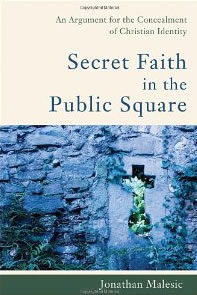Book Notes
 Jonathan Malesic, Secret Faith in the Public Square; An Argument for the Concealment of Christian Identity (Grand Rapids: Brazos Press, 2009), 248pp.
Jonathan Malesic, Secret Faith in the Public Square; An Argument for the Concealment of Christian Identity (Grand Rapids: Brazos Press, 2009), 248pp.
Jonathan Malesic's technical monograph commends a simple theme from Scripture: "Beware of practicing your piety before others in order to be seen by them. . . But whenever you pray, go into your room and shut the door and pray to your Father who is in secret; and your Father who sees in secret will reward you" (Matthew 6:1, 6). Like many theologians, Malesic laments the enormous damage done to the faith by its putative "success" in society. For many American believers, faith is a form of currency (political, economic, social) by which they accrue personal benefits. Think of a politician who makes sure that voters know that he attends church.
Malesic's response to this problem is entirely counterintuitive. He tries to show how deliberate secrecy about one's faith "is a real though under emphasized theme in Christian theological, liturgical, and spiritual tradition." To save our faith we must veil it from others. Malesic has in mind Christianity in America, and especially the "bourgeoisie" and "cosmopolitan evangelicals" who enjoy and strive for social privileges by wearing faith on their sleeves. Only by a return to secrecy, by which Malesic means "intentional concealment of knowledge from another person" (16), can American Christianity be saved from its opportunistic impulse to exploit the gospel for social gain.
In the first part of his book Malesic devotes two chapters each to three Christian intellectuals who commend Christian secrecy. Cyril of Jerusalem's catechetical practices withheld knowledge of the sacraments until after baptism. Kierkegaard's book Works of Love argues that genuinely selfless acts must be hidden in order to avoid the quid pro quo of praise. Dietrich Bonhoeffer wrote that "the Christian cause will be a silent and hidden affair." Having shown through these three theologians that concealing one's Christian identity is "not an isolated tradition"" (162), in the second part of his book Malesic "explains what secrecy about Christian identity in the public life of contemporary America would mean." Successive chapters explore the nature of the self that keeps secrets, churches as communities that conceal even as they evangelize, and then a pointed rejection of the project by Stanley Hauerwas to make Christianity as distinctly visible as possible.
In his historical section Malesic's treatment sometimes feels like a fishing expedition; he has a thesis to prove and he's intent on finding it in Cyril, Kierkegaard and Bonhoeffer. By his own account, Cyril used secrecy to consolidate political power, which seems like a strange example to commend. I would have enjoyed more interaction with the New Testament themes on this subject. He admits that "this book presupposes an attitude of suspicion" (p. 19), and even though his suspicions are often well-founded, sometimes his arguments felt like ad hominem attacks. Not every believer prostitutes the faith for career advancement, and open witness can often lead not to gain but to loss. Finally, I would love to learn from Malesic about real believers and communities that are putting his advice into practice.
Malesic's book reminded me of the poem by Emily Dickinson (1830–1886) called Tell it Slant:
Tell all the Truth but tell it slant —
Success in Circuit lies;
Too bright for mind's infirm intent,
The Truth's superb surprise.As Lightning to the Children eased,
With explanation kind;
The Truth must dazzle gradually,
Or every man be blind.
This highly technical book isn't written for a general readership, and its thesis is not only counter-intuitive but controversial. But I was genuinely intrigued by Malesic's proposal. I hope it gets the consideration it deserves from the guild, and that it finds its place among the ordinary faithful.


